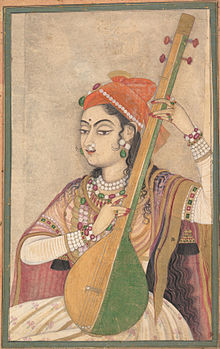Bhangra (music)
| Bhangra | |
|---|---|
| Stylistic origins | Traditional Punjab |
| Cultural origins | India |
| Typical instruments | Vocals, Tabla, drum kit, tumbi, dhol, sarangi, keyboard, acoustic guitar, electric guitar, bass, sitar, violin, dhadd, daf, dholki. |
| Derivative forms | Bhangra dance |
| Music of India | |
|---|---|

A Lady Playing the Tanpura, ca. 1735 (Rajasthan)
|
|
| Genres | |
|
|
| Media and performance | |
| Music awards | |
| Music festivals | |
| Music media | |
| Nationalistic and patriotic songs | |
| National anthem | Jana Gana Mana |
| Regional music | |
|
|
Bhaṅgṛā (Punjabi: ਭੰਗੜਾ (Gurmukhi); ![]() [pə̀ŋɡɽaː]) is a type of upbeat popular music associated with Punjabi culture. It was later developed in England starting in the 1970s by people from the Punjab region of India and Pakistan.
[pə̀ŋɡɽaː]) is a type of upbeat popular music associated with Punjabi culture. It was later developed in England starting in the 1970s by people from the Punjab region of India and Pakistan.
The roots of modern bhangra music date back to the early 1980s, when several Punjabi bands started experimenting with Western styles as well as traditional Punjabi music. Significant amongst these were 'The Black Mist', 'The Shots', 'The Jambo Boys', and 'The Saathies'. However, the first recording artist/group of this type of music in the UK was Bhujhangy Group, founded by brothers Balbir Singh Khanpur and Dalbir Singh Khanpur in Birmingham in 1967. Bhujhangy Group's first major hit was "Bhabiye Akh Larr Gayee" in the early 1970s, released on Birmingham's Oriental Star Agencies label. This was the first song to combine traditional Asian music with modern western instruments, which would be followed by further developments of this in bhangra.
Bhangra music was said to rise in Britain in the 1970s by Punjabi immigrants who took their native folk music and began experimenting by altering it using instruments from their host country. The new genre quickly became popular in Britain replacing Punjabi folk singers due to it being heavily influenced in Britain by the infusion of rock music and a need to move away from the simple and repetitive Punjabi folk music. It indicated the development of a self-conscious and distinctively rebellious British Asian youth culture centred on an experiential sense of self, e.g., language, gesture, bodily signification, desires, etc., in a situation in which tensions with British culture and racist elements in British society had resulted in alienation in many minority ethnic groups, fostered a sense of need for an affirmation of a positive identity and culture, and provided a platform for British Punjabi males to assert their masculinity.
...
Wikipedia
